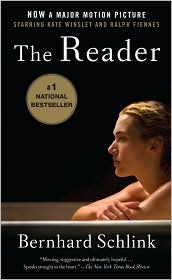
The Bernhard Schlink story, from which Kate Winslet received a best actress Oscar and which has also garnered sharp criticism, recounts a 15-year-old boy’s relationship with a woman twice his age, whom he finds out years later when she’s put on trial, was a Nazi guard during the war. The woman (Hanna), he learns, joined the Nazis to avoid a job promotion and to keep secret her life of shame as an illiterate. The boy (Michael), who narrates as an adult, never overcomes his passion and memories of Hanna and his shame and guilt over it. “I wanted simultaneously to understand Hanna’s crime and to condemn it. … But it was impossible to do both.” He attends her trial and visits a former concentration camp to try to come to grips with her Nazi past. But he doesn’t tell the judge when he discovers she’s illiterate and her defense is marred. Ultimately, she’s found guilty in the deaths of 300 Holocaust victims burned in a church and is sentenced to life in prison, where Michael later sends her audiotapes, and over time, she learns to read. The ending that follows is not exactly expected, but yet, not out of place either amid the dark subject matter.
People seem to be either moved by this story for its moral complexity and themes of love, guilt, shame and horror regarding the Holocaust, or to hate it as revisionist, exculpatory drivel with an empathetic depiction of Hanna and a metaphor of illiteracy that serves to absolve Nazi-era Germans of their knowledge of, or complicity in, the Holocaust. It’s a view of a war criminal’s perspective that can’t help but be dicey. Also the story’s nudity and eroticism, especially in the film, have been ridiculed as gratuitous and exploitive. I think it’s an intense read (and film) that raises disturbing questions. But it’s best you decide.

I havent watched the movie yet but plan to. You are right it’s definitely controversial and non-traditional